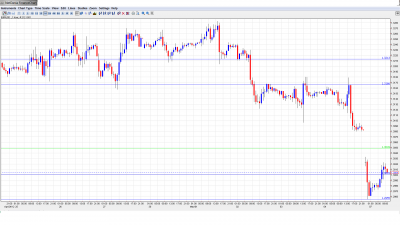Euro dollar was down sharply following the dramatic election results in France and Greece yesterday. The Euro fell below the 1.30 level, hitting a three-month low, as voters in France showed President Sarkozy the door, and voted in Socialist leader Francois Hollande. In Greece, voters vent their anger by throwing out the ruling government, but there was no clear winner. The elections will likely set the tone for EUR/USD movement this week. Although there are no key releases today in Europe or the US, Monday promises be anything but dull, as the markets begin to digest the election results. The euro’s drop overnight below the 1.30 level could be the harbinger of more volatility for the European currency.
Here’s an update on technicals, fundamentals and what’s going on in the markets.
EUR/USD Technicals
- Asian session: EUR/USD dropped to 1.2965, and recovered to consolidate at 1.3012. The European session has quiet, with the pair trading at 1.3017.
- Current range: 1.30 to 1.3050.
- Further levels in both directions: Below: 1.2945, 1.2873, 1.2760, 1.2660 and 1.2623.
- Above: 1.3110,1.3165, 1.3212, 1.33, 1.34, 1.3437, 1.3486, 1.3550 and 1.3615.
- The pair continued to drop sharply, falling below 1.30. This fluid line is currently providing weak support.
- 1.3165 has strengthened in resistance as the pair trades at lower levels.
- After 1.30, 1.2945 is the next level of support.
Euro/Dollar down sharply after election results – click on the graph to enlarge.
EUR/USD Fundamentals
- 8:30 Euro-zone Sentix Investor Confidence. Exp. -15.3. Actual -24.5. Another sign that investor confidence remains low.
- 10:00 German Factory Orders. Exp. +0.5%.
- 19:00 US Consumer Credit. Exp. 9.6B.
For more events later in the week, see the Euro to dollar forecast
EUR/USD Sentiment
- French elections: Socialist leader Hollande won the French presidency on Sunday’s election. The margin of victory may have been small, but the sharp shift to the left will be enormous. The Euro responded negatively, falling below the 1.30 level on the weekend. Hollande’s left-of-center views will surely impact on the markets, and there are predictions that EUR/USD could eventually plummet to 1.20. His election will mark a significant turn from austerity towards growth, perhaps a European Spring.
- Greek elections: Greece went to the polls for the first time after the bailouts. The voters were loud and angry, but the results were messy, with no party strong enough to rule on its own. Political instability is the last thing that Greece (or its lenders) need right now, but that is exactly where things stand after the inconclusive election results. Coalition negotiations, Greek-style, could last for a very long time.
- Local elections in Germany: The northern state of Schleswig-Holstein hold elections on Sunday as well. This is a test for Angela Merkel’s CDU party, and could impact her policy. CDU is expected to lose ground.
- More mixed unemployment data out of US: The markets shrugged off Friday’s mixed employment numbers. Non-Farm Payrolls were well below the market forecast, hitting a four-month low of just 120K. However, with revisions, the 120K improved to 154K. The Unemployment Rate brought better news, dropping a notch to 8.1%.
- Draghi is content staying put: The president of the ECB sees the euro-zone economies still recovering in the second half of the year and passed the ball to the court of governments, not for the first time. As predicted, the ECB maintained its key interest rate at 1.0%. A rate cut next month is still a remote option, as the Euro-zone continues to struggle. His optimism pushed the euro higher, but not for a long time.
- European recession deepening?: The PMI readings disappointed last week, and clearly point to a serious recession in Q2. For many countries, the recession is not new at all: Spain is the latest member of a growing list of European economies now in recession, joining the ranks of a host of others, notably the UK, Netherlands, Belgium, Ireland, Greece, Portugal and Italy. Weak spending in France and lower confidence in Germany is sure to make matters worse. The Euro has slumped badly, and with a new Socialist government in France and political deadlock in Greece, the currency could plummet against the US dollar.
- QE3 chances dropping: Ben Bernanke didn’t rule out QE3, but as time passes by, this option seems quite unlikely, and even Bill Gross joined Primary Dealers and retreated from his certainty that this move will come. A “hands off” policy of low interest rates for the foreseeable future is supportive for the greenback.

